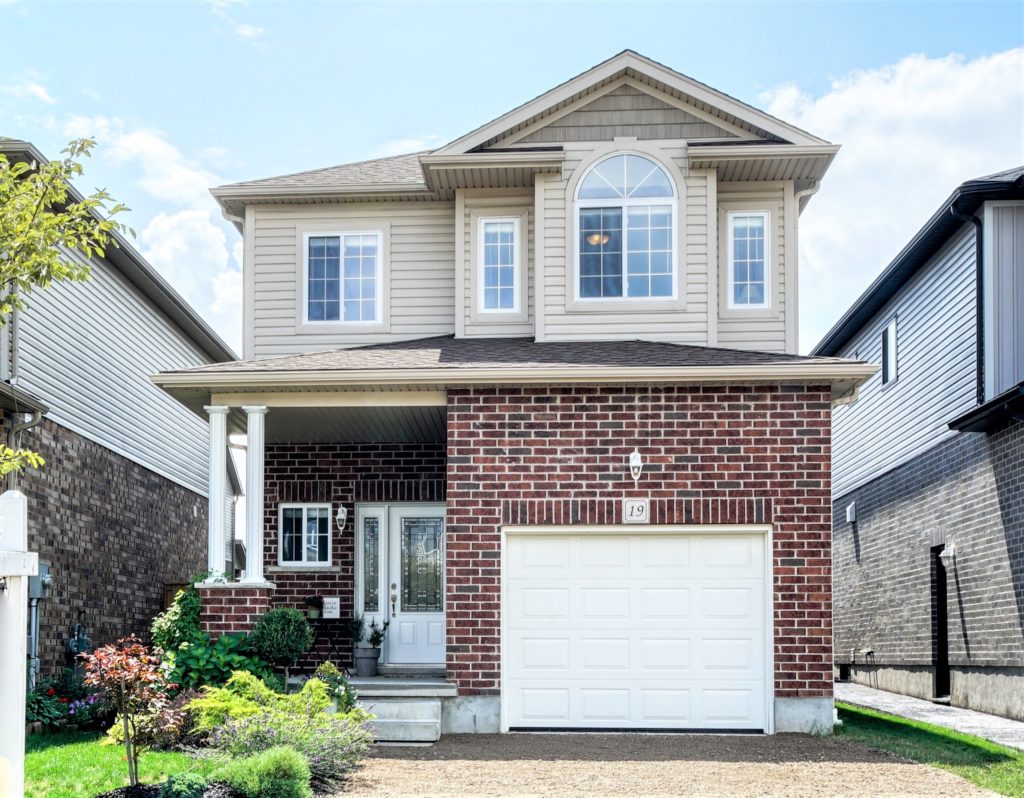Author: Christal Moura
Market Snapshot – January 2022
Feb. 07, 22 | Market Updates

The new year is off to a good start with strong activity in the Cambridge real estate market. Interest rates continue to remain low which is padding the pockets of many people who are looking at diversifying their portfolios by investing in real estate. More houses hit the market in January then in the previous month, but not enough to relieve the hot buyer’s market we have seen over the last year.

Cambridge Association of Realtors® reported 103 total units sold in January, 2022 which coincidentally is the exact same amount as this time last year. But don’t expect 2022 to play out like last year. Even though there were the same number of sales, the dollar value grew 41% and that is not a typo. When looking at all sales in Cambridge, the average price in January 2021 was $667,723 and just one year later the average is now $946,644.

Of the 103 homes sold, 85 were single family freehold (townhouse, semi-detached), 18 were condos and 66 were freehold detached. Despite condos representing the smallest ratio, these properties saw the largest appreciation since January 2021, with over 61.46% increase in the average dollar value.
Given light of the positive start to the year, things may be disrupted subtly sometime in the second quarter when the Bank of Canada releases a new communication reflecting potential rate changes. They know that they need to address inflation, as well as the elevated debt levels. However, it is unforeseeable how all this will truly shake out. What is inevitable, is that the rates will change, but by how much and when.
“Time is not refundable, use it with intention because a year from now you will wish you would have done things differently.”
If you want to discuss what’s happening in the market, or maybe the process of buying or selling, I am always ready to have that conversation. All you have to do, is reach out by filling out the form and we can chat more over coffee.

General Form
Top 10 Moving Tips
Aug. 03, 21 | Buying

Having been there recently myself I thought that perhaps it was fitting that I write a blog post about moving – shedding some light on things I have learned firsthand from the moving process.
Here are my top ten tips to consider
when moving out of and into a new home.
Tip # 1: Give yourself lots of time – don’t procrastinate on getting started. Give yourself lots of time to pack, starting with the off-season items and working your way through decorative items, things you only use on occasion like serving plates or duplicate items you have. It is also wise to set aside a weeks worth of clothing and items you might need for the week prior to moving.
Tip # 2: Be resourceful – there are a lot of unforeseen costs associated with moving, so why not look to Marketplace or Kijiji to see if you can purchase boxes from people who have just moved; not only are you saving money because purchasing boxes can add up, but you are also helping the environment one cardboard box at a time.
Tip # 3: Label, label, label – as soon as you tape up the box, grab a good permanent black marker and label it. Be sure to put what room you want that box to go into, as well as, a word or two about the contents inside so that as you unpack you can do so in a thoughtful manner that helps when organizing. Be sure to not only label the top on the box but also one or two sides of the box, and if a box is heavy or contains fragile contents label that on the box as well.
Tip # 4: Box size matters – and so does it’s contents. You can fit a lot of small things into a small box and that box get heavy pretty quickly. So, think about packing 1-3 heavy items in one box and perhaps several light items into another box. You and/or your movers will appreciate boxes of a relatively consistent weight and size the day of the move.
Tip # 5: Purge before you pack – moving is a great time to go through and let go of items that you may not use, need, or wear anymore. Consider having a garage sale if you have quite a few things, or post individual items on Marketplace or Kijiji or donate to a local shelter or organization.
Tip # 6: Clean as you pack – it is common to have a clause in a Purchase Agreement about the Sellers leaving the home in a “broom swept manner and free of debris and garbage”. So, to make the cleaning easier for you on the day of the move, consider cleaning the spaces you just packed as you go.
Tip # 7: Hire movers – there are many companies out there that you can hire to move all the contents of your home so can rest assured things will be done professionally and efficiently, and perhaps more importantly to some, you don’t have to do that back laboring work. However, perhaps you opt to rent a truck and move things yourself but don’t have the means to move the treadmill or piano, then consider hiring movers that specialize in just that. There are all sorts of moving companies out there that are experts at moving specific heavy, awkward or complicated equipment. Many will also come and disassemble, move, and then reassemble, if need be, as well.
Tip # 8: Transport fragile things in your car – set aside any fragile or delicate items that require a little extra love transporting from all the other boxes and items that will be loaded onto the truck by the movers. Though they will be careful when moving, accidents can happen and if there is something of special importance you want to keep intact err on the side of caution and move that item yourself.
Tip # 9: Have boxes ready by the door – if you have the space in your foyer or your garage, store boxes you have packed for moving there to make it easier for the movers to grab and put them into the truck. The movers will appreciate the boxes being near the door and will free up congestion in your home as people are walking in and out.
Tip # 10: One last look – leave one unused box or a laundry basket aside for when you do your final scan through the home before handing over the keys. There will inevitably be a cupboard full of cans you missed or some electronics for the television that you need to take with you. It may also be advantageous to have a garbage bag and cloth handy in case you notice things that need to be thrown out or wiped up.
Bonus Tip – This isn’t so much as a moving tip but rather some insight that new homeowners often overlook when moving into a new home. Plan ahead to have window treatments. Sometimes the home you are moving into will have blinds or curtains but often the previous homeowner takes them when they move, or if it’s a new build there won’t be any window treatments at all. Use one of your walk thru visits to measure windows so that you can go and select window treatments of your choice ahead of time which can be scheduled to be installed when you move in.
If you are thinking of selling and want to know more about everything that is involved; from listing to moving day, contact me today.
What to Know About Buying a New Home Build in Cambridge
Jun. 21, 21 | Buying

Although still a relatively small town compared to Waterloo, Cambridge is seeing an increase in new construction homes. These properties are gaining popularity and selling fast. For many types of buyers in many stages of their lives, a new home build is a great option.
Here’s a breakdown of what you need to know about buying a new home build in Cambridge.
All Builders are Not Created Equal
With so many options popping up, it’s easy to get overwhelmed about which new home build you are most interested in. However, the first step you should take when looking at any new construction project is to research the builder and/or developer.
Make sure the builder is reputable with a proven track record of successful projects. Check out their other projects in the area to see how things held up, and look online for reviews and testimonials. If possible, you could even walk the subdivision and talk to other homeowners who recently moved in. You should feel confident that the builder has a rock-solid reputation in the area.
The Price You See vs. The Price You Pay
Most new builds are advertised with a “starting” price. This is the base model price that does not include any specific upgrades or customization.
One of the biggest benefits of going with a new build is that you do have the option to customize and upgrade the items you wish. For example, maybe you prefer a premium lot or a marble countertop. Or maybe you want to upgrade the fixtures or invest in a higher-end AC unit. These are all really common requests, but the upgrades and customizations start to add up in cost. It’s also important to note if HST is applicable or if it’s included in the advertised listing price.
The price you end up paying for the home is usually not the price advertised. It’s advisable to have a good REALTOR® in your corner with experience in new home construction to help keep these factors in mind.
Less Negotiation Wiggle Room
When buying a home that’s a few years old, you might have some wiggle room in the negotiations. Perhaps the seller wants a quick sale or they are more willing to negotiate conditions into the contract. This type of transaction happens on a more “person-to-person” level.
Buying a new home build is a little different. This is more like buying a house from a store, not an individual seller. Builders are less likely to negotiate on the price of a new home because it might have an impact on other homes in the development and could result in many buyers looking to negotiate, driving down the value and price for the entire development.
When buying a new home build, it’s better to discuss negotiations for upgrades rather than the list price.
However, many builders offer financial incentives for purchasing a new home build. So you might still get some sort of deal even with reduced negotiating power.
One Word–Warranty
Another major benefit of buying a new home build is the builder’s warranty. Homes older than 7 years do not come with a warranty, but since you are the first person living in a new construction home, you will have a Tarion Warranty. This might just be enough to give you peace of mind and provide some maintenance savings in your first year of owning the home.
Is a New Home Build in Cambridge Right For You?
Whether you are looking to upgrade your home, downsize, or you’re buying your first home, a new build is a great choice for a variety of people in different stages of their lives. But a new home build is still a huge investment that requires attention and care. An experienced real estate professional, like myself can help you navigate the new construction world and get you into a brand-new home that suits your life and your style.
Want to learn more about buying a new home build in Cambridge? Contact me today for a consultation.
Neighbourhood: Your Quick Guide to East Galt
Jun. 21, 21 | Buying

With its mix of modern new builds and beautiful heritage buildings, the Cambridge neighbourhood of East Galt is a stunning example of “when old meets new.” East Galt is situated in the southernmost corner of Galt. Running along the east side of Grand River, also encompassing downtown Cambridge.
Interested in relocating to East Galt? Here’s a quick guide to this stunning, up-and-coming Cambridge neighbourhood:
Old Meets New
One of the most visually striking aspects of East Galt is its diverse architecture. In addition to beautiful century homes and heritage buildings, East Galt has many new developments. Many of the old mills have been repurposed into stunning condos, shopping districts, or restaurants, like the Cambridge Mill restaurant.
In some cases, East Galt architecture literally blends old and new with incredible results. For example, the Cambridge Idea Exchange. Once the location of the old post office, it is now one of East Galt’s most iconic landmarks. And for good reason.
Completed in 2018, this old heritage building was revitalized to incorporate an amazing glass atrium attached to the back of the building, overlooking the Grand River. The striking combination perfectly captures the look and feel of the neighbourhood.
Plenty of Green Space
East Galt is a desirable neighbourhood for many reasons, but one prominent feature is its plentiful green space. Although it’s situated close to the bustling downtown core in Cambridge, near City Hall, East Galt is known for its quiet tree-lined streets, green space, and close proximity to three beautiful parks. Centennial Park, Soper Park, and Churchill Park all provide an essential backdrop for numerous community activities.
Who Lives in East Galt?
With lower density than other neighbourhoods in Cambridge, East Galt residents are typically older individuals and couples who have called this area home for several decades. In the past, East Galt did not have many children or young families, however, this seems to be changing as newer developments are popping up. Younger families are now moving to East Galt because of the green space and close proximity to culture and downtown amenities.
What’s Happening in East Galt?
One of the greatest features of East Galt is that it has a small-town charm thanks to its close proximity to nature and many fantastic outdoor activities, like the Cambridge-Paris Trail. However, it’s also just a hop, skip, and a jump away from downtown. Many residents choose to take walks down the street to visit the numerous local stores, cafes, restaurants, and local weekend markets in the area.
The Idea Exchange is also a major hub of activity in the community, providing access to both online and in-person resources, art galleries, events, and entertainment.
The Future of East Galt
Many say that East Galt is a community on the cusp of gentrification. However, the community is also actively involved in the direction of the neighbourhood and have a voice in future planning. Heritage preservation is important in this area, which means that the unique look and feel of East Galt should remain for years to come.
Although as new developments geared toward new demographics continue to pop up in East Galt, the community is only getting better. East Galt truly has it all.
Want to learn more about relocating to East Galt? Let’s talk. Reach out today to learn more about this vibrant community.
My Top 7 Listing Agreement FAQs
Jun. 21, 21 | Selling

You’ve made the big decision to sell your home. Congratulations! This is an exciting time. Now it’s time to meet with an agent you trust and discuss what exactly is involved. One key component is the listing agreement.
For many sellers, the listing agreement can be a little intimidating, but in this post, I am breaking down the top 7 listing agreement FAQs you need to know before signing:
1) What is a Listing Agreement?
Simply speaking, a listing agreement is a contract between the homeowner and the listing agent. It essentially gives the real estate agent permission to sell the property on behalf of the homeowner. It’s a legally binding contract that both parties must agree on and abide by.
3) What are the Main Components of a Listing Agreement?
There are several types of listing agreements depending on the property being sold. The most common type of listing agreement is an MLS (Multiple Listing Service) Agreement, which allows your property to be listed on the national MLS website.
Listing agreements like this are comprehensive, they include everything that goes into the sale of your home. Some topics that are outlined in the listing agreement include:
- Listing agreement commence date and expiry date
- Marketing strategy (MLS listing, for sale signs, online and print marketing etc.)
- Rights granted to use listing content subject to copyright in the promotion of the sale (virtual tours, home descriptions, images, floorplans, etc.)
- Legal clauses such as lawyer fees, provisions for dispute resolution, and mediation
- The agent’s commission for both selling and cooperating agents
4) Why do I Need to Sign a Listing Agreement?
Anyone who works with a real estate agent needs to sign a listing agreement. It sets the stage for a successful real estate transaction and protects all parties involved. By outlining and agreeing to the terms in writing beforehand, it holds everyone accountable for their actions and ensures a smooth and stress-free process. This is why it is so important for sellers to read the listing agreement carefully and make sure they understand each line.
4) When do I Need to Sign a Listing Agreement?
The listing agreement is typically signed whenever you are ready for the real estate agent to begin actively marketing your home. For some homeowners, this could be the first time they meet their agent. For others, this step could happen weeks or months down the road. It all depends on your unique timeline.
5) What is the Length of Time a Listing Agreement Lasts?
As a legally binding contract, the listing agreement will have an expiration date attached. The agreement is valid from the moment you sign it until the expiration date. This date could vary depending on a number of factors. For example, if the market is quiet or the condition of your home is not at its best, the expiration date might go a little longer. In a busy market and a property that is in demand, you might see a shorter expiration date. Typically, the agreement lasts between 2-6 months of signing. Anything that lasts longer requires additional acknowledgment.
6) How Does Commission Work on a Listing Agreement?
The listing agreement is where the agent’s commission is outlined. In Ontario, it’s common that sellers are responsible for paying both the listing agent and the buyer’s agent commission. In many cases, the commission is evenly split between the two. For example, your listing agreement could state that you pay 5% commission to the agent and have that figure split evenly between the two agents–so both would receive 2.5% commission.
7) How Much Does a Listing Agreement Cost?
A listing agreement does not cost anything to prepare to sign. Rather, it’s a contract that stipulates the compensation that the agent will receive upon successfully selling your property.
Signing A Listing Agreement Shouldn’t Be Scary
If you’re feeling tense or unsure about signing a listing agreement, you should consider why you are feeling reluctant. Are you signing with the right agent? Are you comfortable with the terms? At the end of the day, the listing agreement is designed to protect you as much as it is to protect the agent. By taking the time to fully understand the terms, you should feel confident moving forward with an agent you can trust!
Looking to sell? Contact me today to learn more.









